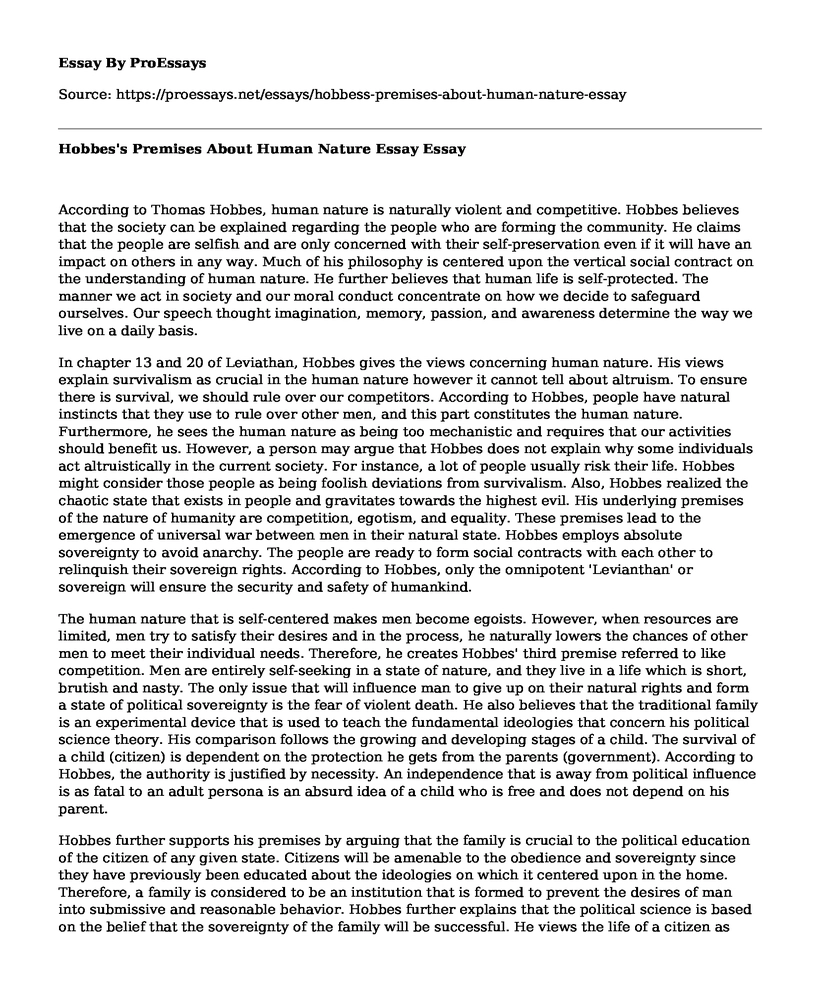According to Thomas Hobbes, human nature is naturally violent and competitive. Hobbes believes that the society can be explained regarding the people who are forming the community. He claims that the people are selfish and are only concerned with their self-preservation even if it will have an impact on others in any way. Much of his philosophy is centered upon the vertical social contract on the understanding of human nature. He further believes that human life is self-protected. The manner we act in society and our moral conduct concentrate on how we decide to safeguard ourselves. Our speech thought imagination, memory, passion, and awareness determine the way we live on a daily basis.
In chapter 13 and 20 of Leviathan, Hobbes gives the views concerning human nature. His views explain survivalism as crucial in the human nature however it cannot tell about altruism. To ensure there is survival, we should rule over our competitors. According to Hobbes, people have natural instincts that they use to rule over other men, and this part constitutes the human nature. Furthermore, he sees the human nature as being too mechanistic and requires that our activities should benefit us. However, a person may argue that Hobbes does not explain why some individuals act altruistically in the current society. For instance, a lot of people usually risk their life. Hobbes might consider those people as being foolish deviations from survivalism. Also, Hobbes realized the chaotic state that exists in people and gravitates towards the highest evil. His underlying premises of the nature of humanity are competition, egotism, and equality. These premises lead to the emergence of universal war between men in their natural state. Hobbes employs absolute sovereignty to avoid anarchy. The people are ready to form social contracts with each other to relinquish their sovereign rights. According to Hobbes, only the omnipotent 'Levianthan' or sovereign will ensure the security and safety of humankind.
The human nature that is self-centered makes men become egoists. However, when resources are limited, men try to satisfy their desires and in the process, he naturally lowers the chances of other men to meet their individual needs. Therefore, he creates Hobbes' third premise referred to like competition. Men are entirely self-seeking in a state of nature, and they live in a life which is short, brutish and nasty. The only issue that will influence man to give up on their natural rights and form a state of political sovereignty is the fear of violent death. He also believes that the traditional family is an experimental device that is used to teach the fundamental ideologies that concern his political science theory. His comparison follows the growing and developing stages of a child. The survival of a child (citizen) is dependent on the protection he gets from the parents (government). According to Hobbes, the authority is justified by necessity. An independence that is away from political influence is as fatal to an adult persona is an absurd idea of a child who is free and does not depend on his parent.
Hobbes further supports his premises by arguing that the family is crucial to the political education of the citizen of any given state. Citizens will be amenable to the obedience and sovereignty since they have previously been educated about the ideologies on which it centered upon in the home. Therefore, a family is considered to be an institution that is formed to prevent the desires of man into submissive and reasonable behavior. Hobbes further explains that the political science is based on the belief that the sovereignty of the family will be successful. He views the life of a citizen as either of the following two extremes: firstly, the experience is seen as being total obedience to the state power and secondly, the life is offered to the terrors of a primitive state of nature. Hobbes has related fear with pacification in his idea of the family education. However, both continued appeasement or a perpetual fear is very elevating approaches to human survival. Despite the flaws this theory has, the way Hobbes views the family as a small kind of the state is distinctive. If we decide to follow Hobbes's premise that the family can be seen regarding political power, we can, therefore, in the same way, criticize family by political principles. By forming an association between obedience and protection that has been taught in the family, Thomas Hobbes brings about the possibility of humanizing the state by educating fairness in the family, consent, equality and respecting the human self-esteem.
As a result of this reason, his conception of the life of a family regarding political affiliation appears to be theoretically sound. Hobbes explains that the authority of the father is not that of an outdated tradition of the house sovereignty, but it is a problem of the present state. Men compete with each other to satisfy their desires and thus become enemies. Therefore, competition creates hatred, envy, and jealousy which ignites war among men.
Cite this page
Hobbes's Premises About Human Nature Essay. (2022, Mar 03). Retrieved from https://proessays.net/essays/hobbess-premises-about-human-nature-essay
If you are the original author of this essay and no longer wish to have it published on the ProEssays website, please click below to request its removal:
- Deceptive Social Media Advertising of Pharmaceutical Products - Coursework Example
- Understanding the Concept of Personhood Essay
- Potential Ethical Considerations on International Thermonuclear Experimental Reactor (ITER) Project
- Argumentative Essay on Work Ethic in Millennials
- Meditations in Philosophy of Descartes Essay Example
- Essay Example on Abortion: Thompson's Justifications and Objections
- Essay Sample on Relative vs. Universal Moral Theories: Understanding the Difference







